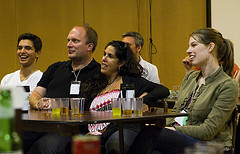 In late August, CAMMAC (a music camp north of Montreal) hosted the third annual Bitnorth conference. This year the theme was Human 2.0. Attendees presented a 5 minute “short bit” on a topic of their choice, which inspired many lively debates. Slides and recordings will be online soon but in the meantime, here are some of the interesting Human 2.0 ideas and questions that emerged over the course of the weekend:
In late August, CAMMAC (a music camp north of Montreal) hosted the third annual Bitnorth conference. This year the theme was Human 2.0. Attendees presented a 5 minute “short bit” on a topic of their choice, which inspired many lively debates. Slides and recordings will be online soon but in the meantime, here are some of the interesting Human 2.0 ideas and questions that emerged over the course of the weekend:
Do the benefits of online sharing make the loss of privacy worthwhile?
 Julie Matlin extolled the virtues of blogging as a means of coping with stress, making sense of difficult situations and finding support. She explained that since she began writing her intensely personal “Mommy Said What?” blog, she feels an immense sense of freedom to be herself. People judge her less, and understand her behaviour better, when they know exactly what is happening in her life at any given time.
Julie Matlin extolled the virtues of blogging as a means of coping with stress, making sense of difficult situations and finding support. She explained that since she began writing her intensely personal “Mommy Said What?” blog, she feels an immense sense of freedom to be herself. People judge her less, and understand her behaviour better, when they know exactly what is happening in her life at any given time.
How will we augment our bodies in future?
 Donald Donovan explored some ways in which humans could add new senses to the human body by installing sub-dermal magnetic implants. We could detect poison gases or heat signatures, know compass direction instinctively, use lie detection in everyday conversation, or even have truly silent ringtones. RFID chips can be implanted to allow us unlock doors with a wave of the hand. This sparked discussions about the future of the human race. Will we add so many robot parts we will cease to be human? Is the ultimate goal of man-machine interaction a sort of Borg-like collective consciousness or hive-mind? James Duncan also raised concerns about how mankind is using up the planet’s resources of not just oil, but also food and water. Attendees debated whether technology will save us or if we will wipe out civilization before we can organize ourselves to act.
Donald Donovan explored some ways in which humans could add new senses to the human body by installing sub-dermal magnetic implants. We could detect poison gases or heat signatures, know compass direction instinctively, use lie detection in everyday conversation, or even have truly silent ringtones. RFID chips can be implanted to allow us unlock doors with a wave of the hand. This sparked discussions about the future of the human race. Will we add so many robot parts we will cease to be human? Is the ultimate goal of man-machine interaction a sort of Borg-like collective consciousness or hive-mind? James Duncan also raised concerns about how mankind is using up the planet’s resources of not just oil, but also food and water. Attendees debated whether technology will save us or if we will wipe out civilization before we can organize ourselves to act.
Could tablets save education?
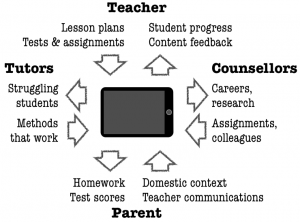 Perhaps our best hope for the future is to improve education. Many people believe that the iPad, and other tablet devices, could revolutionize education, by letting every student progress at their own pace, a true “no child left behind” for our children. What’s more, teachers can then use analytics to see what is working, what areas need more attention, and to tailor their lessons to help every child reach their potential. Alistair Croll explored these ideas and also predicted that teachers’ unions will fight such progress, as it would move teaching (in the US at least) back to a performance-based model of recognition. David Chouinard took this a step further and argued that the entire model of education today is based on outdated industrial-era thinking, and that we should harness the power of the Internet to create more collaborative, digital schools for learning.
Perhaps our best hope for the future is to improve education. Many people believe that the iPad, and other tablet devices, could revolutionize education, by letting every student progress at their own pace, a true “no child left behind” for our children. What’s more, teachers can then use analytics to see what is working, what areas need more attention, and to tailor their lessons to help every child reach their potential. Alistair Croll explored these ideas and also predicted that teachers’ unions will fight such progress, as it would move teaching (in the US at least) back to a performance-based model of recognition. David Chouinard took this a step further and argued that the entire model of education today is based on outdated industrial-era thinking, and that we should harness the power of the Internet to create more collaborative, digital schools for learning.
Is boxed-in thinking inhibiting the progress of society?
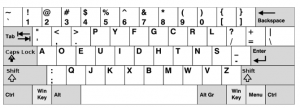 The prevalence of outdated ways of thinking was a recurring theme. Xiao Yu reminded us that we still use the QWERTY keyboard – a layout designed to slow down typing so that typewriter hammers don’t get jammed. The Dvorak keyboard is provably more efficient, but we stick with what we know, even on new types of device like the iPad. I (Alex Bowyer) proposed that the model of files and folders is similarly dated and inefficient. We should start thinking of our personal data as streams, which would not only help us manage information overload, but enable much more powerful applications and computer systems to be built. It seems that human society is highly resistant to change.
The prevalence of outdated ways of thinking was a recurring theme. Xiao Yu reminded us that we still use the QWERTY keyboard – a layout designed to slow down typing so that typewriter hammers don’t get jammed. The Dvorak keyboard is provably more efficient, but we stick with what we know, even on new types of device like the iPad. I (Alex Bowyer) proposed that the model of files and folders is similarly dated and inefficient. We should start thinking of our personal data as streams, which would not only help us manage information overload, but enable much more powerful applications and computer systems to be built. It seems that human society is highly resistant to change.
Are we losing serendipity?
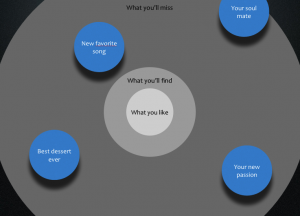 We don’t just resist change, we seek out things we already know & like. Amazon, Pandora and Google News all encourage you to find content similar to what to you like. Dating sites help you find other people that are just like you. Lenny Rachitsky put forward a convincing case that while having such systems tailor the digital world to us might seem attractive, we are losing something valuable in the process – the happy accidents that allow us to stumble upon new foods we love, fall in love with people with whom we share nothing in common, or broaden our minds by exposing us to new and exciting ideas. Jeremy Edberg and Ross Noble also reminded us of the value of exposing ourselves to people and ideas outside our immediate influences – as engineers, businesspeople, or just as humans. Mike Gero pointed out that sometimes as we inject technology into hobbies like fishing, we lose something of the escapism we originally sought.
We don’t just resist change, we seek out things we already know & like. Amazon, Pandora and Google News all encourage you to find content similar to what to you like. Dating sites help you find other people that are just like you. Lenny Rachitsky put forward a convincing case that while having such systems tailor the digital world to us might seem attractive, we are losing something valuable in the process – the happy accidents that allow us to stumble upon new foods we love, fall in love with people with whom we share nothing in common, or broaden our minds by exposing us to new and exciting ideas. Jeremy Edberg and Ross Noble also reminded us of the value of exposing ourselves to people and ideas outside our immediate influences – as engineers, businesspeople, or just as humans. Mike Gero pointed out that sometimes as we inject technology into hobbies like fishing, we lose something of the escapism we originally sought.
How can we model real-world relationships?
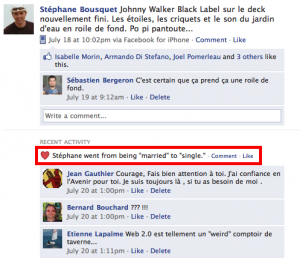 In the digital age, new technologies create new problems. But the impact of social sites like Facebook has rarely been as profound as that experienced by Stephane Bousquet. When he and his wife broke up, her simple act of changing her status from married to single on Facebook, broadcast to all of his friends that he was now single, which of course had profound consequences for all his relationships with friends and family. In the physical world, we have much more control over when and how information passes to our friends – in the Facebook age this was the equivalent of calling up 500 friends right after the other and saying “Hey, we’ve split up”. Who owns data that represents our shared relationships and personal interactions – should it be like a joint bank account, controlled by both parties? Bryan Watson looked at another impact of social networks, pointing out that as we collect more and more online “friends”, we are effectively sacrificing a few strong ties for a larger set of weak ties – in effect devaluing friendships – something that rang true for many of the attendees.
In the digital age, new technologies create new problems. But the impact of social sites like Facebook has rarely been as profound as that experienced by Stephane Bousquet. When he and his wife broke up, her simple act of changing her status from married to single on Facebook, broadcast to all of his friends that he was now single, which of course had profound consequences for all his relationships with friends and family. In the physical world, we have much more control over when and how information passes to our friends – in the Facebook age this was the equivalent of calling up 500 friends right after the other and saying “Hey, we’ve split up”. Who owns data that represents our shared relationships and personal interactions – should it be like a joint bank account, controlled by both parties? Bryan Watson looked at another impact of social networks, pointing out that as we collect more and more online “friends”, we are effectively sacrificing a few strong ties for a larger set of weak ties – in effect devaluing friendships – something that rang true for many of the attendees.
Games, music and storytelling
 Not all the “short bits” were what-ifs and thought exercises – there was much fun to be had too. We saw demonstrations of how to change a digital photograph into music (Christine Davis), how to build your own iPad-controlled Arduino robot (Nick Kruchten), and how a wall might be turned into an interactive touchscreen (Theo Ephraim). We were reminded how simple human acts remain just as important today as they were before the Internet; Julie Steele explored storytelling and its role in helping us understand the world we live in, and Gina Minks explored the impact of the digital divide and the dangers of digital recordings being taken out of context – something that is far easier today than it used to be.
Not all the “short bits” were what-ifs and thought exercises – there was much fun to be had too. We saw demonstrations of how to change a digital photograph into music (Christine Davis), how to build your own iPad-controlled Arduino robot (Nick Kruchten), and how a wall might be turned into an interactive touchscreen (Theo Ephraim). We were reminded how simple human acts remain just as important today as they were before the Internet; Julie Steele explored storytelling and its role in helping us understand the world we live in, and Gina Minks explored the impact of the digital divide and the dangers of digital recordings being taken out of context – something that is far easier today than it used to be.
Ilana Ben-Ari showed this inspiring video created by Charles Ledbeater, reminding us we are going through a period of great change as a society. Ilana then demonstrated her new communication skills game, Twonicorn – which is a great non-technical example of the mass innovation the video talks about.
Next year, Bitnorth will take place on September 17th and 18th.
Photos by Eva Blue (cc) and diagrams/screenshots are by the presenters.








 @
@ Tags:
Tags: 


 Like all images on the site, the topic icons are based on images used under Creative Commons or in the public domain. Originals can be found from the following links. Thanks to
Like all images on the site, the topic icons are based on images used under Creative Commons or in the public domain. Originals can be found from the following links. Thanks to
[…] a more details on the presentations please take a look at the Human 2.0 Bitnorth 2010 post swfobject.embedSWF("http://www.vimeo.com/moogaloop.swf", "vvq-691-vimeo-1", "400", "300", "9", […]
[…] is a detailed write-up of the Short Bit I first presented at Bitnorth 2010, with lots of background and links to references I found while putting together that presentation. […]
[…] is a detailed write-up of the Short Bit I first presented at Bitnorth 2010, with lots of background and links to references I found while putting together that presentation. […]
[…] is a detailed write-up of the Short Bit I first presented at Bitnorth 2010, with lots of background and links to references I found while putting together that presentation. […]
[…] is a detailed write-up of the Short Bit I first presented at Bitnorth 2010, with lots of background and links to references I found while putting together that presentation. […]